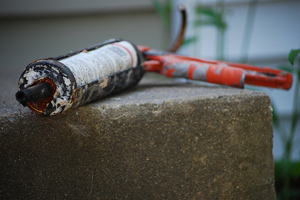
Homeowners are being offered rebates from $ 3,000 to $ 8,000 for energy-efficient improvements to their homes because of Cash for Caulkers, also known as the Home Star bill. The Cash for Caulkers 2010 bill, which was passed by the House on Thursday, will dole out $ 5.7 billion over two years for a program aimed to stimulate the construction industry, which has been gutted by the recession. Republicans were nearly united in being against the Cash for Caulkers bill which needs Senate approval still before Obama can sign it.
Cash for Caulkers details
Because of Cash for Caulkers 2010, Homeowners won't need quick cash to make energy saving home improvements. The name of the bill is inspired by 2009 Cash for Clunkers bill that had vehicle buyers get rid of their gas hogs. CBS News reports that Cash for Caulkers details consist of two programs: The Silver Star program provides upfront rebates of up to $ 3,000 for specific energy-efficient improvements in homes, such as installing energy-efficient appliances or duct sealing, insulation or new windows or doors. A Gold Star program entitles individuals to up to $ 8,000 when they conduct comprehensive energy audits and implement measures that reduce their energy used throughout their homes by a lot more than 20 percent.
Cash for Caulkers rules
To prevent fraud, Cash for Caulkers rules require licensing for all participating contractors and a certain percentage of projects could be inspected. The Silver Star program has upfront rebates at the time of purchase on many different renovations. There is a credit worth up to $ 1500 per improvement and is capped at $ 3,000 or fifty percent of the total cost. Following an energy audit, the Gold Star program will provide $ 3,000 for energy savings of at least 20 percent, with an additional $ 1,000 for each and every additional 5 percent energy savings. This rebate is capped at $ 8,000 or 50 percent of the project cost.
Cash for Caulkers home energy audit
Cash for Caulkers details about the Gold Star home energy audit requirement can be found on the web. A home energy auditor can help home owners assess how much energy their homes use and evaluate what measures will improve efficiency. Five minutes and the last 12 months of utility bills are all it takes for a do-it-yourself home energy audit using energystar.gov. A lot more energy savings will be delivered by a professional home energy auditor. A professional home energy auditor uses a variety of equipment like blower doors, which measure the rate heating or cooling escapes the home, and infrared cameras, which reveal hard-to-detect areas of air infiltration and missing insulation.
Cash for Caulker's impact on economy
Now that it has passed the House, Cash for Caulkers 2010 moves to the Senate. CBS News reports that the Senate will likely attach Cash for Caulkers to the next jobs bill. Those who support Cash for Caulkers argue that 168,000 jobs might be created. They also estimate that 3 million households could take advantage of its programs, saving $ 9.2 billion in home energy costs over 10-years. 168,000 jobs will be created. The Cash for Caulkers bill would approve $ 600 million over two years for grants to states for replacing older mobile homes with newer, more energy efficient models.
Resources for the article
CBS News reports
http://www.cbsnews.com/stories/2010/05/06/politics/main6467175.shtml
energy audit
http://www.energysavers.gov/your_home/energy_audits/index.cfm/mytopic=11160
energystar.gov
http://www.energystar.gov/index.cfm?c=home_improvement.hm_improvement_audits
No comments:
Post a Comment